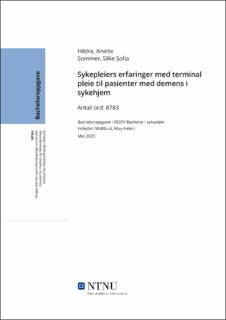| dc.contributor.advisor | Midtbust, May Helen | |
| dc.contributor.author | Hildre, Anette | |
| dc.contributor.author | Sommer, Silke Sofia | |
| dc.date.accessioned | 2020-07-07T16:07:58Z | |
| dc.date.available | 2020-07-07T16:07:58Z | |
| dc.date.issued | 2020 | |
| dc.identifier.uri | https://hdl.handle.net/11250/2661227 | |
| dc.description.abstract | Hensikt: Tilegne seg kunnskap om hvordan sykepleier erfarer å gi terminal pleie til pasienter med demens i sykehjem.
Metode: Systematisk litteraturstudie.
Resultat: Funnene tyder at det er vanskelig for sykepleier å imøtekomme de behovene pasienter med demens har i den terminale fasen. Kommunikasjon er en stor barriere når det kommer til samhandling med pasienter med demens. Det er i tillegg økt behov for kompetanse og kunnskap på sykehjemmene. Det kan også være utfordrende med tverrprofesjonelt samarbeid. Pasientforløpet preges av lite kontinuitet og for få ressurser. Sykepleierne bryr seg mye om pasientene, og ønsker deres beste, men de kan ofte oppleve at ressurser og tidsbegrensninger står i veien for å utøve sykepleie av tilstrekkelig kvalitet.
Konklusjon: Sykepleierne opplevde at det finnes utfordringer knyttet til å utøve personsentrert omsorg til døende pasienter med demens på sykehjem. Mangel på kontinuitet og ressurser hindret sykepleierne i å gi den terminal pleien de vurderte at pasientene med demens hadde behov for. Pasientgruppen står i fare for ikke å få en personsentrert og verdig avslutning på livet. Sykepleierne hadde en krevende arbeidshverdag der de kunne kjenne på både frykt, sorg og utilstrekkelighet.
Nøkkelord: Demens, terminal pleie, sykehjem, sykepleie, erfaringer. | |
| dc.description.abstract | Aim: To gain knowledge of how nurses experience providing terminal care to patients with dementia in nursing homes.
Method: Systematic literature study.
Result: The findings indicate that it is difficult for nurses to meet the needs of patients with dementia in the terminal phase. Communication is a major barrier when it comes to interaction with patients suffering from dementia. In addition, there is an increased need for expertise and knowledge in nursing homes. Cross-professional collaboration can also be a challenging factor. The patient course is characterized by little continuity and insufficient resources. Nurses care a lot about the patients and want the best for them, but they can often find that resources and time constraints are in the way of practicing nursing of sufficient quality.
Conclusion: The nurses experienced that there are challenges associated with performing person-centered care for dying patients with dementia in nursing homes. Lack of continuity and resources prevented the nurses from providing the terminal care that they considered that patients with dementia needed. The patient group is in danger of not getting a person-centered and worthy ending of life. The nurses experienced demanding working days where they could feel both fear, sadness and inadequacy.
Keywords: Dementia, terminal care, nursing home, nursing, experience. | |
| dc.publisher | NTNU | |
| dc.title | Sykepleiers erfaringer med terminal pleie til pasienter med demens i sykehjem | |
| dc.type | Bachelor thesis | |
